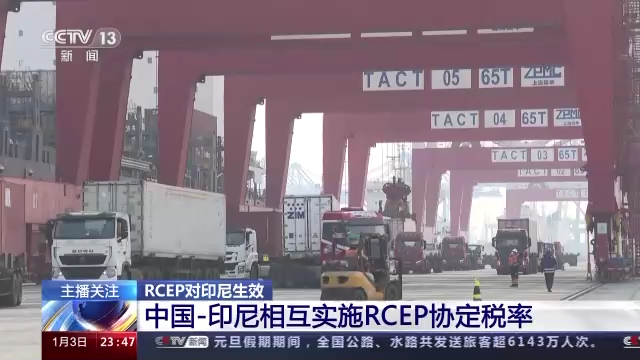According to the Ministry of Commerce, the “Regional Comprehensive Economic Partnership Agreement” (RCEP) has entered into force for Indonesia on January 2. So far, 14 of the 15 members of RCEP have entered into force. After RCEP takes effect for Indonesia, China and Indonesia will mutually implement the RCEP agreement tax rate in accordance with the commitments of the RCEP agreement.
Under RCEP, on the basis of the China-ASEAN Free Trade Area, Indonesia has added zero-tariff treatment to more than 700 tax code products in my country, including some auto parts, motorcycles, TVs, clothing, shoes, and plastic products. Among them, some auto parts, motorcycles, and some clothing products will immediately realize zero tariffs from January 2, and other products will gradually reduce to zero tariffs within a certain transition period.
On the basis of the China-ASEAN Free Trade Agreement, my country will also reduce taxes on Indonesian-made pineapple juice and canned food, coconut juice, pepper, diesel, paper products, some chemicals and auto parts, and further open up the market.
Starting from January 2, in accordance with the commitment of the RCEP agreement, Indonesia will immediately implement zero tariffs on 65.1% of products originating in China, and China will also implement immediate zero tariffs on 67.9% of products originating in Indonesia.
Consul General of Indonesia in Shanghai: RCEP will promote trade and investment between China and Indonesia
After RCEP takes effect in Indonesia, what benefits will it bring to the economic and trade between China and Indonesia? Check out our reporter’s exclusive interview with Indonesian Consul General in Shanghai Dai Ning.
CCTV reporter Dou Yunyun:Behind me is the newly established Indonesian Experience Center, where some Indonesian specialty products and handicrafts are available. The Indonesian Consul General in Shanghai told me that this is one of Indonesia’s preparations for RCEP to take effect in Indonesia.
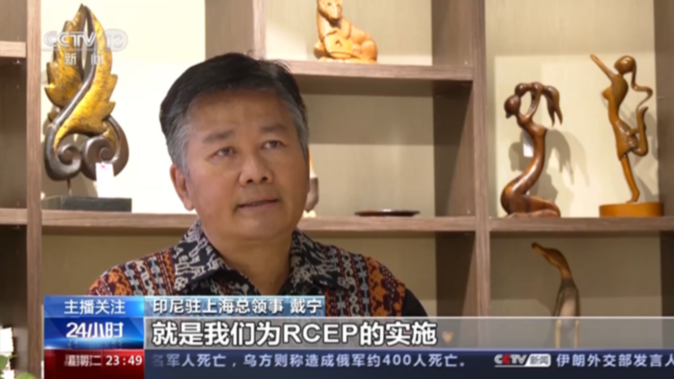
Dai Ning, Consul General of Indonesia in Shanghai:This Indonesia Experience Center is a microcosm of our preparations for the implementation of RCEP. Here, private companies, China Indonesian Chamber of Commerce, Indonesia Shanghai Trade Promotion Center, Indonesian Consulate General in Shanghai, and Indonesian Embassy in China work together to increase exports and expand investment. This is an important part of our preparations for RCEP .
Dai Ning introduced that the trade between China and Indonesia is highly complementary. The main commodities China exports to Indonesia include mechanical and electrical products, steel and its products, mainly industrial products; the main commodities imported from Indonesia include mineral fuels, Iron and steel, animal and vegetable oils, etc., are mainly energy and resource-intensive products and agricultural products.
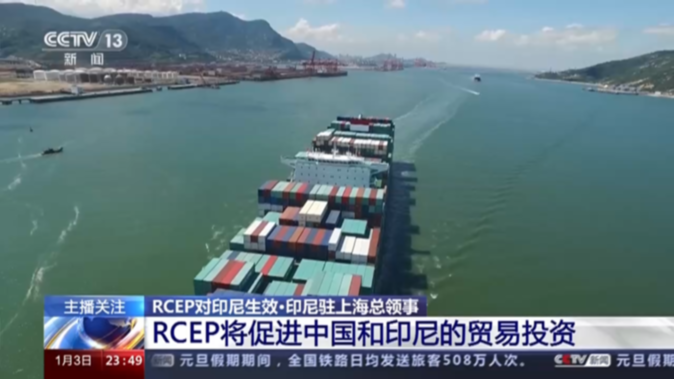
The entry into force of RCEP for Indonesia will continue to promote the deepening of economic, trade and investment relations between Indonesia and China, and further strengthen existing cooperation.
Dai Ning, Consul General of Indonesia in Shanghai:RCEP is not only tariff relief for goods, but also provides certainty and openness in trade services, standards, investment, e-commerce, movement of natural persons, sanitary and phytosanitary rules, and technical cooperation. RCEP will bring greater motivation and determination to stakeholders, especially businesses.
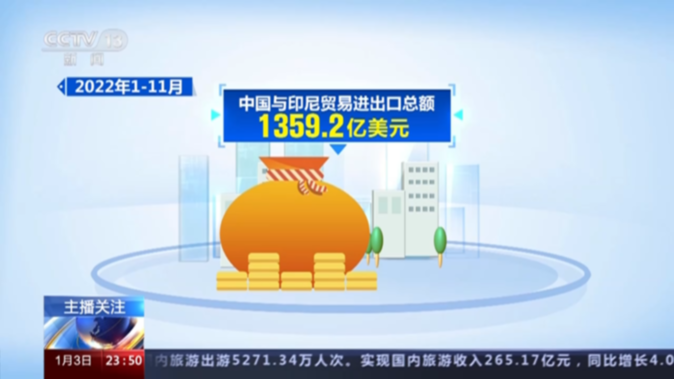
From January to November 2022, the total import and export volume between China and Indonesia was US$135.92 billion, a year-on-year increase of 22.7%. Currently, Indonesia is China’s third largest trading partner in ASEAN, after Vietnam and Malaysia.
China continues to remain Indonesia’s largest trading partner, and it is also Indonesia’s largest export market and largest source of imports.
Enterprises gain benefits and industries welcome new opportunities
After RCEP takes effect in Indonesia, the RCEP “circle of friends” will continue to expand. While foreign trade companies will receive “real gold and silver” tariff preferences, regional industrial development will also usher in new opportunities.
After RCEP came into effect for Indonesia, Qingdao Customs issued a RCEP certificate of origin for a local aquatic product company through the international trade “single window” at the RCEP Shandong Enterprise Service Center. With this certificate, 18 tons of frozen Malaysians exported to Indonesia For salmon, 105,000 yuan of tariffs can be reduced or exempted.
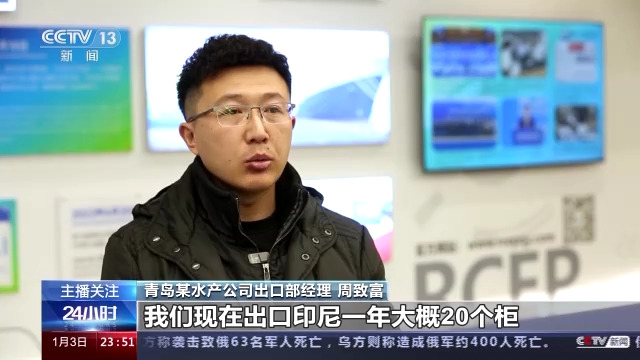
Zhou Zhifu, export manager of a seafood company in Qingdao:We now export about 20 containers a year to Indonesia, with a value of about 20 million yuan. After RCEP takes effect in Indonesia, the tariff will be reduced to 0, and the annual benefit will be 2 million yuan, which is estimated to drive the growth of our exports to Indonesia by at least 10%.
Previously, China-Indonesia trade has been using the relevant tax rates of the China-ASEAN Free Trade Agreement, and most commodities still need to pay certain tariffs. After RCEP took effect in Indonesia, the tax rate of many commodities was directly reduced to zero, which brought greater benefits to foreign trade enterprises. At the same time, the further expansion of the scope of use of the cumulative rules of origin will also lower the threshold for enterprises to enjoy benefits.
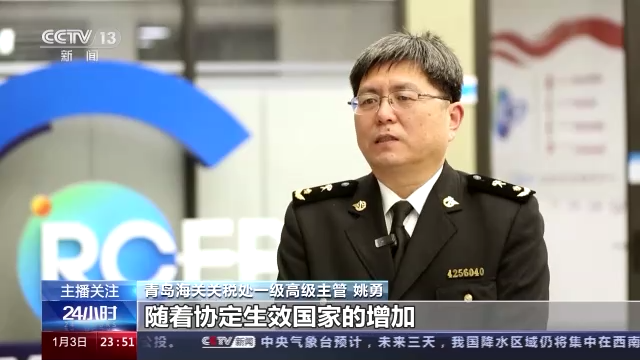
Yao Yong, the first-level senior director of the Qingdao Customs Tariff Department:With the increase of the number of countries where the agreement takes effect, the scope of accumulation of origin of advantageous industries such as agricultural products in Shandong has further expanded, which is conducive to the rational allocation of production factors in the region.
The entry into force of RCEP in Indonesia has also brought new opportunities to this Indonesian paper company investing in China. The person in charge of the company said that this will bring benefits to the construction and development of the company’s industrial chain in the region.
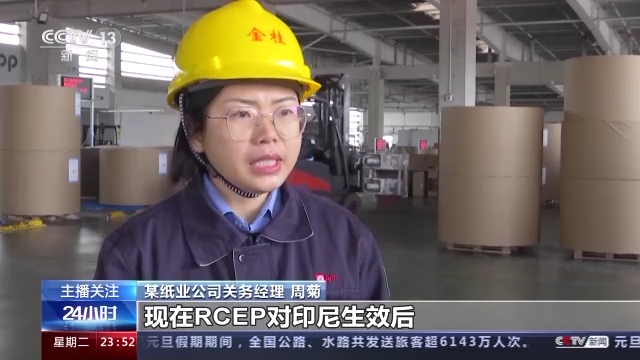
Zhou Ju, customs manager of a paper company:Now that RCEP has come into effect in Indonesia, we hope to organically combine the development of forestry-pulp-paper integrated industries in Guangxi, Guangdong, Hainan, Yunnan and Indonesia, expand potential economic cooperation with enterprises in ASEAN countries, and achieve a win-win situation for all parties .
(Headquarters CCTV reporter Zhang Xin Zhang Yuxiang Dou Yunyun Wang Jie Tang Gaolin Qingdao Station)
[
责编:丛芳瑶 ]
